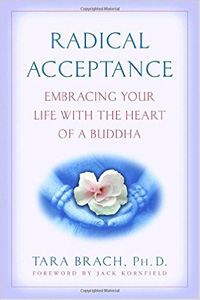 Book Review: Radical Acceptance Embracing your life with the heart of a Buddha, by Tara Brach.
Book Review: Radical Acceptance Embracing your life with the heart of a Buddha, by Tara Brach.
Review by Donna Andersen
You realize, or at least suspect, that you have a sociopath in your life — that’s why you’re reading Lovefraud. You may still be in a state of shock — you never really understood that people like this actually existed. But they do; now what do you do?
Lovefraud is full of information and advice about escaping a sociopath and dealing with the fallout. Generally, recovery means moving forward along two paths. You can pursue both paths at the same time, and progress on one path helps you with the other one.
The first path is solving the practical problems the sociopath has caused, such as escaping safely, getting a divorce, rebuilding your finances, finding a new job any of the myriad of ways that your day-to-day life needs to be restored.
The second path is your emotional recovery. The calculated deception and betrayal of a sociopath shakes you to your core, undermines the very foundation of your self-concept.
Tara Brach’s book, Radical Acceptance Embracing your life with the heart of a Buddha, can help you with this second path, your emotional recovery.
I’ve frequently written that to recover from a sociopath, the first step is acceptance. This does not mean you condone what the sociopath did, nor that you continue to allow this disordered person to exploit or abuse you.
Acceptance means that you acknowledge the truth of what happened. You stop wishing things were different, and stop dreaming about what might have been. The sociopath really did intentionally deceive and exploit you. The sociopath never loved you. To this person, you were always only a target.
Radical Acceptance
This is unbelievably painful. You thought you found love, but it was an illusion. If you allowed the person into your life, you’re berating yourself for believing the lies. You think your family is supposed to love you and care for you, but you realize that you’re just a pawn. You feel anger, shame, grief, betrayal.
Typically, you may try to shield yourself from the pain, perhaps by burying it inside you. Tara Brach’s idea of Radical Acceptance suggests that you allow yourself to feel your experience emotionally and physically in all its messiness.
“Clearly recognizing what is happening inside us, and regarding what we see with an open, kind and loving heart, is what I call Radical Acceptance,” she writes.
Often, Tara says, we are keeping ourselves trapped by our own beliefs and fears. It doesn’t have to be that way. She writes:
The way out of our cage begins with accepting absolutely everything about ourselves and our lives, by embracing with wakefulness and care our moment-to-moment experience. By accepting absolutely everything, what I mean is that we are aware of what is happening within our body and mind in any given moment, without trying to control or judge or pull away. I do not mean that we are putting up with harmful behavior — our own or another’s. This is an inner process of accepting our actual, present-moment experience. It means feeling sorrow and pain without resisting. It means feeling desire or dislike for someone or something without judging ourselves for the feeling or being driven to act on it.
Throughout the book, Tara explains how to do this.
Clear seeing and compassion
Tara Brach is both a clinical psychologist and a meditation teacher. Her work combines Western psychology and Eastern spiritual practices, drawing heavily on the teachings of Buddhism.
With this Buddhist perspective, she identifies two parts of genuine acceptance — seeing clearly and holding our experience with compassion. She writes:
Clear seeing is often described in Buddhist practice as mindfulness. This is the quality of awareness that recognizes exactly what is happening in our moment-to-moment experience. When we are mindful of fear, for instance, we are aware that our thoughts are racing, that our body feels tight and shaky, that we feel compelled to flee — and we recognize all this without trying to manage our experience in any way, without pulling away. Our attentive presence is unconditional and open — we are willing to be with whatever arises, even if we wish the pain would end or that we could be doing something else.
Compassion is our capacity to relate in a tender and sympathetic way to what we perceive. Instead of resisting our feelings of fear or grief, we embrace our pain with the kindness of a mother holding her child. Compassion honors our experience; it allows us to be intimate with the life of this moment as it is. Compassion makes our acceptance wholehearted and complete.
Both wings together help us remain in the experience of the moment, just as it is. When we do this, something begins to happen — we feel freer, options open before us, we see with more clarity how we want to proceed. Radical Acceptance helps us to heal and move on, free from unconscious habits of self-hatred and blame.
Throughout the book, Tara’s words and insights impart a feeling of peace, or at least the idea that peace is possible. No matter what we have endured — and having been involved with a sociopath, we have endured much — there is a way to heal and feel alive again.
Techniques of Radical Acceptance
Tara provides examples of how to use Radical Acceptance to change our lives. An initial step is to identify the sensations of our body. She points out that “all our reactions to people, to situations, to thoughts in our mind are actually reactions to the kind of sensations that are arising in our body.” Practicing mindfulness enables us to witness what we feel, without resisting it. Guess what happens? The feelings dissipate.
Tara spends an entire chapter on fear. “Fear,” she explains, “is the anticipation of future pain.” But sometimes, we may not know what is causing the fear. Radical Acceptance offers a way to work through the fear, and find an inner source of safety and belonging.
In another chapter, Tara talks about developing compassion for ourselves. “Compassion,” she writes, “means to be with, feel with, suffer with.” Many of us are highly empathetic, and capable of feeling compassion for others a trait that sociopaths target. But when we are suffering, especially after the devastation inflicted by a predator, can we feel compassion for ourselves? Tara explains how to do it.
A key technique is meditation, and at the end of every chapter of this book, Tara includes the text for guided meditations. They are designed to help you access feelings and beliefs that may be below the surface of your awareness, but affecting your outlook and actions.
Sense of inner peace
Radical Acceptance, by Tara Brach, is a wonderful book. Tara explains the concepts in a warm, heartfelt manner, and illustrates them with anecdotes from her own life, and the lives of the people she has helped.
My involvement with a sociopath caused me tremendous pain and internal losses. I know from experience that accessing the deep suffering that I felt, and allowing my self to experience it, was key to my recovery. Tara’s book wasn’t available when I was working though my pain, but my path was similar to what she describes. Letting go of the emotional burdens leads to freedom.
True recovery from a sociopath means finding — perhaps for the first time — a sense of inner peace. Yes, it is possible, and Radical Acceptance is a way to do it.
Radical Acceptance Embracing your life with the heart of a Buddha, is available on Amazon.com.
More information on TaraBrach.com.




































 Woman fakes blindness for 15 years, collects nearly $400,000 in veteran’s benefits
Woman fakes blindness for 15 years, collects nearly $400,000 in veteran’s benefits